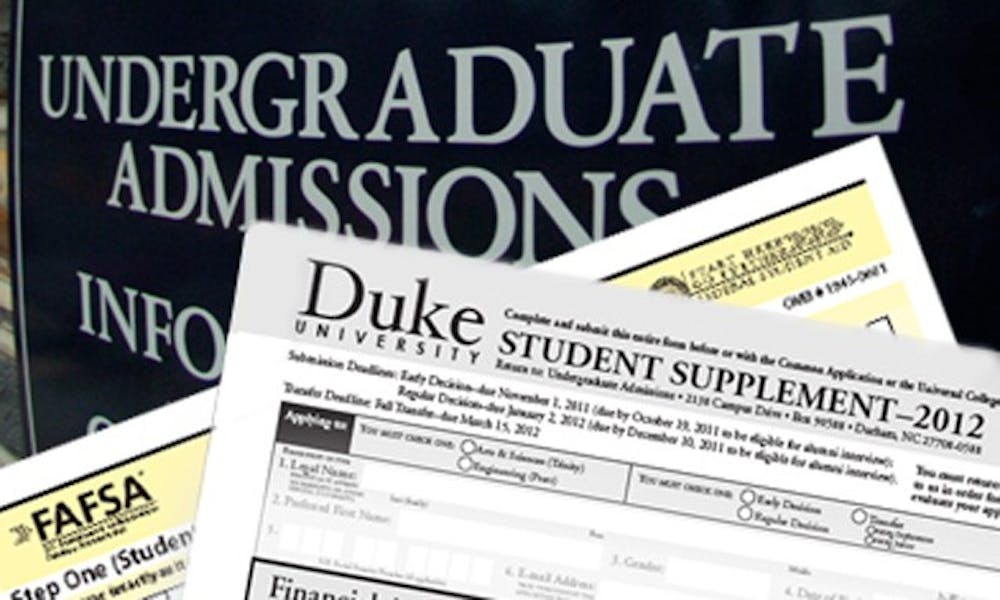Duke is part of a fortunate list of institutions able to maintain a need-blind college admissions process.
According to a September survey conducted by Inside Higher Ed, 31.7 percent of admissions counselors at four-year colleges consider recruiting students who are able to pay full tuition a high priority for the next two to three admission cycles. This is indicative of a trend among many institutions to eliminate need-blind admissions. Similarly, 34.3 percent of counselors at four-year universities said their institution has focused more attention on recruiting students who can pay full tuition in the last year.
Despite this trend, Duke will continue its need-blind policy, as it reaffirmed its commitment to need-blind admissions at the Board of Trustees meeting last week.
Director of Undergraduate Admissions Christoph Guttentag said the need-blind admissions policy is part of the bedrock of the University. The policy states that an applicant’s ability to pay tuition will not be a factor in the admission decision.
Guttentag added that it makes sense to reaffirm Duke’s commitment to the policy given the trend among four-year colleges to eliminate need-blind admissions.
“Given the financial pressure universities are under and given the economic climate, people are wondering about the commitment of colleges to access and affordability,” Guttentag said. “A time when the public might be wondering about a commitment is the time to remind them that yes, we have had this policy, we continue to have this policy and we expect to have this policy in the future.”
Guttentag, who could not comment on whether he participated in the Inside Higher Ed survey, said the University has never wavered in its commitment to need-blind admissions.
More institutions—such as Carleton College, Gettysburg College and Smith College, who have adopted need-aware policies that limit the number of admitted students with financial need—are transitioning away from need-blind admissions because of what is happening to the private higher education business model, said Jacob Vigdor, professor of public policy and economics and director of graduate studies and the Ph.D. program.
University funding usually comes from three sources—tuition, endowments and federal grants, Vigdor said. As tuition has rapidly increased nationwide, and endowments and federal grants have tumbled, it is more difficult for both the average family to afford a private university education and for a university to offer full financial aid.
Vigdor added that some universities may eliminate need-blind admissions in order to balance budgets.
“There are a lot of bills you have to pay in a university,” Vigdor said. “When all your normal sources of revenue get squeezed, something’s gotta give.”
The 2008 financial crisis caused the University’s endowment, which provides the University with financial aid dollars, to fall 20 percent between June 2008 and January 2009. This prompted some administrators to question need-blind admissions. Guttentag said the University never actually considered eliminating the policy.
“Those were some of the shortest discussions I have ever been a part of,” he said.
Board of Trustees Chair Richard Wagoner, former president and CEO of General Motors Corp. and Trinity ’75, said the University is very fortunate to have the endowment it has—the University endowment grew 24.5 percent in fiscal year 2010-2011. The Board, Wagoner said, finds significant value in being able to be need-blind and attract students across the academic and financial spectrum.
When President Richard Brodhead came to Duke in 2004, he was concerned about the amount of funding available for need-blind admissions, so the University raised $300 million, Wagoner said.
“It is a significant cost for the University, so the more endowment we can raise for it, the better,” Wagoner said. “But [the need-blind admissions policy] is a fundamental commitment of the University and will continue to be.”
Duke’s need-blind admissions policy applies only to U.S. citizens and legal permanent residents. The University is not need-blind toward international applicants, though some need-based financial aid is available for them. Guttentag said the University does not yet have enough resources to be need-blind for international applicants, noting that adding an international applicant need-blind policy in the next couple of years is very unlikely.
“In a perfect world, we would be need-blind for everybody,” Guttentag said. “[Need-blind admissions for international applicants] is one place where almost every college draws the line, and we are comfortable doing so as well.”
Get The Chronicle straight to your inbox
Signup for our weekly newsletter. Cancel at any time.

